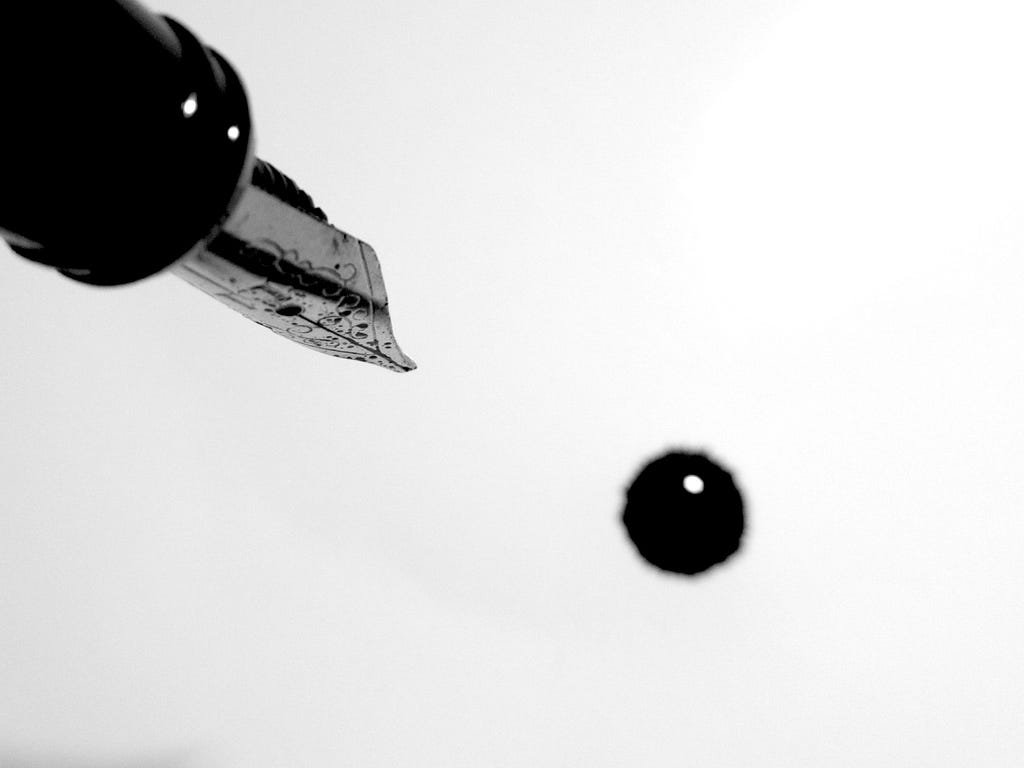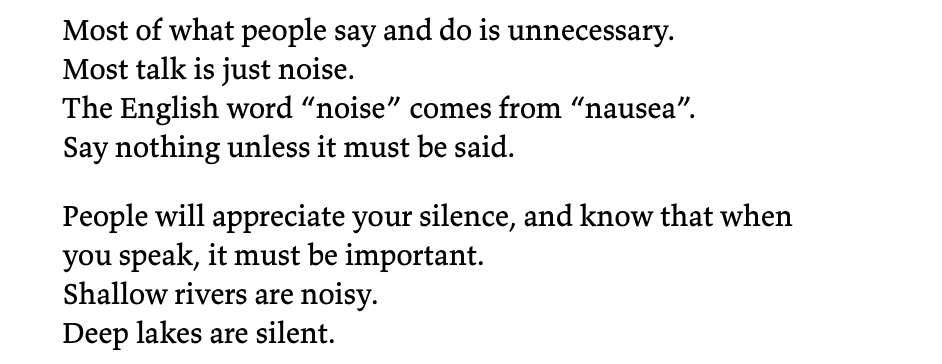Leave the excessive content behind

Something is compelling about a creator who posts once a month. Publishes a book every two years. Tweets infrequently. Creates silent vlogs instead of forty-five-minute front-facing camera segments.
Creators who are selective with what they share ooze intrigue. Email your subscribers daily, and they are likely to unsubscribe. Email them biweekly, and you might win their attention. Not because your daily shares lack value, but because your audience immediately understands that you are not selective with what you share. Everything is shareable and interesting to you. The more you share = the less perceived value.
Selective sharing
Selective sharers invest in long-term projects in their main time and automate everything else to keep their business running in their spare time. They don’t rush to tweet or share a random thought unless they feel (spiritually) inclined to. They will only share something if they’ve thought about it — for more than a few minutes. They build upon their ideas, bind random thoughts, and produce best-selling books.
Because of their selective sharing pattern, you are curious when they share. You develop a subconscious perception to value what this person has to say: it is worthy of your time, intellectual consideration, and trust.
A personal favorite
Every few months, I will find myself lurking on Derek Siver’s website. Sivers doesn’t use social media, runs a minimalistic ad-free website to communicate with his readers, and shares his work infrequently.
His content is insightful. Nothing feels like spam. And I am always intrigued to read.
The last time I checked, I learned he’s releasing a new book. I felt impatient (his new book not being released yet), so I bought his latest 2021 release — I remember wanting to buy it but forgot about it.
The strange surprise?
Enter page 16 of his book:

P.S. If you order a book from his website, he will also email you the book in all versions (PDF, audiobook, ePub, etc.). What a gem.
The burden of excessive content
If content continues to be pushed out at this rate, we might need to outsource an extra planet for our data centers. But on a less dramatic note, we are collectively tired of content feeding and consumption.
As a writer, creator, or influencer, you probably feel compelled to create excessive content to maintain and grow your following, reach, sales, and influence. You spend your time investing in this “leverage” phenomenon; posting here and there, and everywhere, thrice a day, on five different platforms.
The idea is that if you do this consistently for eight months (to be oddly specific), enough people will notice, share, and like your posts, inevitably leading you to the viral territory that will change your life: you will become a ten-figure course seller, or Andrew Tate famous (there’s no in-between).
In this relentless pursuit, I fear you are losing the big picture, the plot, the point, yourself. Because while there is nothing wrong with consistency, the problem is when this content lacks strategic planning, vision, and purpose.
It is produced merely to participate in trends, maintain relevance, and spam your followers because God forbid they forget you exist. When the primary motivation becomes appeasing algorithms and trend-hopping so the algorithm doesn’t punish you, you are not doing your personal brand a favor. There is nothing personal about it.
Creator Burnout
People with 9–5 jobs don’t worry about a second business persona they have to maintain on social media. If they are creators, they indulge it on the side, as a hobby. It is undeniably one of the best perks of having a stable job. For digital creators, this privilege remains elusive. We find ourselves compelled to maintain a consistent online presence, as we are not yet established or secure enough to limit our posts to once a month or quarter. In our quest to sell products and build our personal brands, we heavily rely on social media marketing.
If you find yourself compelled to produce excessive content to sustain and expand your following, reach, sales, and influence, consider if this is working for you or simply prompting premature burnout. You might soon realize that excessive posting is a brutal distraction.
Digital Minimalism
Post-pandemic, overconsumption has overshadowed the “less is more” attitude provoked by a wave of sensational minimalism. Many people despise minimalism because it makes them feel guilty. But minimalism isn’t just limited to things, but also digital consumption. The death of minimalism has invited more trends, content, products, social media, spam, and more and more of everything.
Every social app is designed to breed and maintain excessive content. But if we’re all stuck consuming and creating minuscule fleeting content — who will write the classics and direct the masterpieces?
“Digital Minimalism: A philosophy of technology use in which you focus your online time on a small number of carefully selected and optimized activities that strongly support things you value, and then happily miss out on everything else.”
― Cal Newport, Digital Minimalism: Choosing a Focused Life in a Noisy World
The more social media you consume, the more you feel compelled to engage in excessive posting and updating. When you are not on your phone, you rarely think about posting. However, as soon as you “check” Instagram, you feel an instant urge to engage and share something on your story. No social media equals no desire to produce content.
The point is not to quit social media but to manage its hold on you. Unsubscribe from its endless cycle of creating minuscule content that will disappear from everyone’s feed by tomorrow. Instead, invest your time in long-format content has the potential to make it to a bookstore or the big screen.
“The ability to perform deep work is becoming increasingly rare at exactly the same time it is becoming increasingly valuable in our economy. As a consequence, the few who cultivate this skill, and then make it the core of their working life, will thrive.” — Cal Newport
Good books and films last generations
There is a reason your cousin’s favorite film is still Titanic. Carnegie’s 1936 classic “How To Win Friends and Influence People” continues to be a recommendation for developing friendships and charisma. The prevalent religions in the world rely on holy books revealed more than a hundred decades ago.
The problem is that most people don’t like to commit to the long processes that precede the making of a good classic or beautiful work of art. Until you enjoy the research, commitment, and daily dedication to something meaningful, you will never experience the full extent of your creativity nor the fulfillment of delayed gratification.
“I love immersing myself in the universe of a novel for years. There is never a time when I am more alive. Some writers suffer through that process, but I enjoy it. Being in that universe, that imperfect universe is like being in prayer.” — Paris Review Interview with author Arundhati Roy
If you don’t have an online presence you feel compelled to maintain, consider yourself lucky. Being disconnected from the content train puts you at an advantage. You have the luxury of time and freedom to invest in long-term pursuits that will eventually make you memorable.
Sacred Hours
Find your sacred hours for deep work. To experience delayed gratification and long-term success, get good at carving out sacred spaces of uninterrupted time to do the deep work. You must master managing distractions and disconnecting from the constant influx of notifications and feed feeding.
“He was adamant about writing five pages a day, five days a week. His writing hours were typically between 4:30 am and 9 am.” — Literary Hub Interview with author Walter Dean Myers
Early hours are my sacred hours. Without fail, if I use my phone in the morning, I wind up lethargic and distracted. I lose the momentum to do something significant with my time and inevitably waste a productive working window.
At all costs, protect your sacred hours reserved for deep work and moving the needle forward. Whether you desire to be influential or successful, this is the way.
Isra A. is a passionate writer based in Bahrain, a little island in the Middle East.
Post Less, Write More was originally published in The Writing Cooperative on Medium, where people are continuing the conversation by highlighting and responding to this story.
Go to Source
Author: Isra A.
